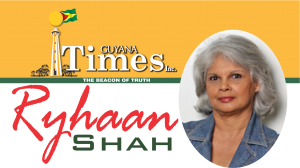Ryhaan Shah
It’s a fascinating phobia – that of self-loathing. Indians here and in Trinidad and Tobago suffer from the pathology; and the society, instead of helping the self-loathers to achieve wellness, actually embraces them as the ideal Indian.
While self-loathing is a pathology that exists in communities everywhere, it is hardly ever promoted and encouraged as is done here by the state, the media, and by society at large in a conscious and concerted effort to realise the extinction of one ethnic group.
It adds another dimension to the observation that Guyana is a very sick society. When Frantz Fanon wrote in his “Black Skin, White Masks” that those who adore Black people are as pathological as those who hate them, he was speaking to both the racists who are phobic about Blacks and to those who celebrate Blacks, no matter what they do.
Indian self-loathing has a decidedly political slant in Guyana, where the self-loather is often a willing tool in the arsenal that is used to diminish the perceived enemy. In this context, the self-contempt is often tied to justifications of everything African Guyanese; which, as Fanon observed, is part of the pathology.
The pathology is embraced and encouraged perhaps because it appears an easy way out of the dilemma of our racial divide for politicians who are lazy and cowardly, and who are comfortable playing to their partisan enclaves.
Instead of working to find concrete and constructive solutions to the serious issues that bedevil our state and society, our leaders rely instead on promoting the jingoism of social cohesion and oneness, and delight that there is enough self-contempt to go around to make their work of fashioning that “oneness” easier.
That a Christian evangelical was recently permitted by a number of head-teachers to proselytise in public schools highlights the universal acceptance of Euro-Christian beliefs and values as the status quo. That one of the head-teachers is a professed Hindu shows just how deeply rooted this notion is in the national psyche.
Had a pandit, swami or moulvi approached the very same head-teachers to preach their respective message, they would have been denied permission. No one would argue this point.
The head-teachers undoubtedly felt that they were carrying out state policy as embodied in the propagandist “one people, one nation, one destiny” agenda of the national motto. This motto is most often interpreted simplistically by politicians to mean that the assimilation, miscegenation, and cultural extinction required to accomplish this desired national goal can only be right and lawful.
The Christian conversion of the Indian community was first attempted by the colonial powers, perhaps because the policy had had such universal success with the African slaves, who, stripped even of cultural memories and beliefs, were easy converts.
It was not the same, however, with the Indian immigrants. They travelled with their beliefs and their gods, and while most resisted the attempts at conversion then, the colonisation of the Indian mind continues. As with all such colonisation, it begins with instilling self-contempt, and in the “one people” equation, it is the Indian who loses.
Indians now adopt Christian names to gain social acceptance; and by converting to Christianity, Hindus in particular are most often succumbing to the portrayal of their beliefs as pagan and backward. No one wants to be viewed this way, so the pressure to surrender is tremendous. While Hindu leadership must accept some responsibility for the success of conversions, they do have to contend with slick evangelical messages and copious literature, and the considerable funding that drives the proselytising campaign.
Such conversion adds to the self-loathing pathology of Indian Guyanese. The colonisation to Christianity gives the converted a sense of superiority that is jealously guarded. To avoid recidivism, even Indian foods and garb are avoided.
It is unlikely that any society can progress healthily when a whole group of its citizens are being encouraged to dislike themselves, to deny themselves and their history, and to even be prejudiced against themselves.
The “one people” agenda can only ever accommodate one people. This statement might appear trite, but for most, it embodies the truth about Guyana’s goal as a society; and statements that are made about diversity and respect, about pluralism and tolerance, are only so much blather spoken to accommodate political correctness.
Denouncing Indian Guyanese who express pride in their culture will undoubtedly continue, and the Indians doing the denouncing will also continue to be rewarded.
To build a nation from our peoples’ diverse strengths is a challenge. It can never be built successfully, however, on a pathology of self-hate.










